Adam Curtis
description: British filmmaker, focuses on socio-political issues
38 results
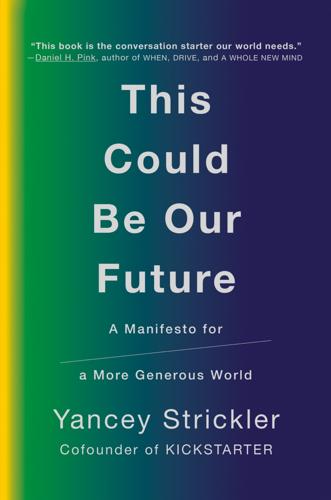
This Could Be Our Future: A Manifesto for a More Generous World
by
Yancey Strickler
Published 29 Oct 2019
What man-as-producer can afford is one thing; what man-as-consumer can afford is quite another thing. But since the two are the same man, the question of what man—or society—can really afford gives rise to endless confusion. Another compelling line of thought on this comes from the filmmaker Adam Curtis in an interview I did with him for The Creative Independent (“Adam Curtis on the Dangers of Self-Expression,” March 14, 2017): If you want to make the world a better place, you have to start with where power has gone. It’s very difficult to see. We live in a world where we see ourselves as independent individuals. If you’re an independent individual, you don’t really think in terms of power.
…
To Tristram Stuart and Simon Smiles, thanks for using your incredibly valuable time to help make this book better. To my friends Elisabeth Holm, Jason Butler, Rafael Rozendaal, Haden Polseno-Hensley, and Justin Kazmark, thanks for reading early drafts. To Alex Taborrak, thanks for being willing to share not just what you loved, but what you hated about the book. To my friends Adam Curtis, Ian Rogers, and Simon Russell, thanks for lending an ear and your brains to these ideas. To Michael Walzer, the philosopher who wrote Spheres of Justice, and Elizabeth Anderson, the philosopher who wrote Value in Ethics and Economics, thank you for your brilliant ideas. I hope this book takes them a significant step forward into the public consciousness.
…
Pink, Drive: The Surprising Truth About What Motivates Us Financial Independence Retire Early Chris Martenson and Adam Taggart, Prosper! How to Prepare for the Future and Create a World Worth Inheriting Medicine Siddhartha Mukherjee, The Emperor of All Maladies: A Biography of Cancer David Wootton, Bad Medicine: Doctors Doing Harm Since Hippocrates FURTHER WATCHING The Adam Curtis films The Trap, The Century of Self, and HyperNormalisation NOTES INTRODUCTION front page of China Daily: The China Daily headline ran on October 27, 2017. a healthy society: Tucker Carlson’s monologue was delivered on January 3, 2019, on Fox News. poll by Harvard’s Institute of Politics: Harvard’s Institute of Politics poll about young people and capitalism was reported in Time magazine (“American Capitalism’s Great Crisis,” May 11, 2014).
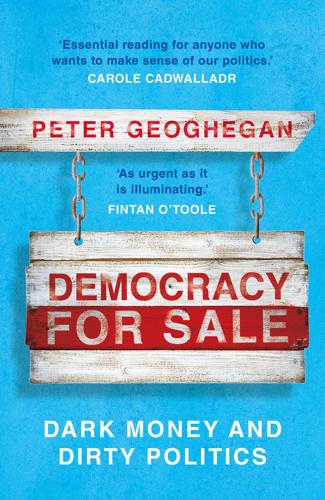
Democracy for Sale: Dark Money and Dirty Politics
by
Peter Geoghegan
Published 2 Jan 2020
Now He’s Suing The Man He Says Is To Blame’, Buzzfeed, October 2018. 33 Dan Bloom, ‘Founder of Brexiteer Legatum Institute think tank “was suspected of working for Russian intelligence”’, Mirror, May 2018. 34 Peter Geoghegan, ‘Legatum breached charity regulations with Brexit work, Charity Commission finds’, openDemocracy, May 2018. 35 Catherine Neilan, ‘IEA poaches Legatum’s top Brexit adviser Shanker Singham and team’, City A.M., March 2018. 36 Adam Curtis, ‘The Curse of Tina’, BBC, September 2011. 37 Jane Mayer, Dark Money: The Hidden History of the Billionaires Behind the Rise of the Radical Right (London, 2018), p. 80. 38 Adam Curtis, ‘The Curse of Tina’, BBC, September 2011. 39 Ibid. 40 Richard Cockett, Thinking the Unthinkable: Think-Tanks and the Economic Counter-Revolution, 1931–83 (London, 1995), p. 166. 41 Adam Curtis, ‘The Curse of Tina’, BBC, September 2011. 42 Peter Clarke, ‘Serial Evangelists’, London Review of Books, June 1994. 43 Felicity Lawrence, Rob Evans, David Pegg, Caelainn Barr and Pamela Duncan, ‘How the right’s radical thinktanks reshaped the Conservative party’, Guardian, November 2019. 44 Ibid. 45 Lee Fang, ‘Sphere of Influence: How American Libertarians Are Remaking Latin American Politics’, The Intercept, August 2017. 46 Andy Beckett, When the Lights Went Out: Britain in the Seventies (London, 2010), p. 274. 47 Ibid., p. 276. 48 Ibid., p. 48. 49 Ibid., p. 276. 50 Peter Clarke, ‘Serial Evangelists’, London Review of Books, June 1994. 51 ‘Commanding Heights’, PBS.
…
In the guise of a research institute, it would be a covert weapon to change political and public opinion. In doing so it would spawn a multibillion-dollar industry that would change the shape of politics, particularly in the United States but also in Britain.37 The idea for the Institute for Economic Affairs came from Friedrich Hayek. According to the documentary-maker Adam Curtis, after the Second World War Fisher paid a visit to Hayek at the London School of Economics, where the Austrian was an economics professor.38 Like Hayek, Fisher feared that communism and socialism would overwhelm the West and believed that government should have almost no role in people’s lives.
…
Now He’s Suing The Man He Says Is To Blame’, Buzzfeed, October 2018. 33 Dan Bloom, ‘Founder of Brexiteer Legatum Institute think tank “was suspected of working for Russian intelligence”’, Mirror, May 2018. 34 Peter Geoghegan, ‘Legatum breached charity regulations with Brexit work, Charity Commission finds’, openDemocracy, May 2018. 35 Catherine Neilan, ‘IEA poaches Legatum’s top Brexit adviser Shanker Singham and team’, City A.M., March 2018. 36 Adam Curtis, ‘The Curse of Tina’, BBC, September 2011. 37 Jane Mayer, Dark Money: The Hidden History of the Billionaires Behind the Rise of the Radical Right (London, 2018), p. 80. 38 Adam Curtis, ‘The Curse of Tina’, BBC, September 2011. 39 Ibid. 40 Richard Cockett, Thinking the Unthinkable: Think-Tanks and the Economic Counter-Revolution, 1931–83 (London, 1995), p. 166. 41 Adam Curtis, ‘The Curse of Tina’, BBC, September 2011. 42 Peter Clarke, ‘Serial Evangelists’, London Review of Books, June 1994. 43 Felicity Lawrence, Rob Evans, David Pegg, Caelainn Barr and Pamela Duncan, ‘How the right’s radical thinktanks reshaped the Conservative party’, Guardian, November 2019. 44 Ibid. 45 Lee Fang, ‘Sphere of Influence: How American Libertarians Are Remaking Latin American Politics’, The Intercept, August 2017. 46 Andy Beckett, When the Lights Went Out: Britain in the Seventies (London, 2010), p. 274. 47 Ibid., p. 276. 48 Ibid., p. 48. 49 Ibid., p. 276. 50 Peter Clarke, ‘Serial Evangelists’, London Review of Books, June 1994. 51 ‘Commanding Heights’, PBS. See also www.pbs.org/wgbh/commandingheights/shared/minitext/prof_keithjoseph.html; accessed 23 Jan. 2020. 52 Adam Curtis, ‘The Curse of Tina’, BBC, September 2011. 53 George Monbiot, ‘A rightwing insurrection is usurping our democracy’, Guardian, October 2012. 54 David Parker, The Official History of Privatisation Volume 1: The Formative Years 1970–1987 (London, 2009), p. 42. 55 Jonathan Gornall, ‘Big tobacco, the new politics, and the threat to public health’, The BMJ, May 2019. 56 Stian Westlake, ‘The strange death of Tory economic thinking’, Capx, April 2019. 57 Mark Littlewood, ‘The next Tory leader must be a bullish libertarian, not a bland managerialist’, Telegraph, March 2019. 58 Stian Westlake, ‘The strange death of Tory economic thinking’, Capx, April 2019. 59 Nick Cohen, ‘Brexiters never had a real exit plan.
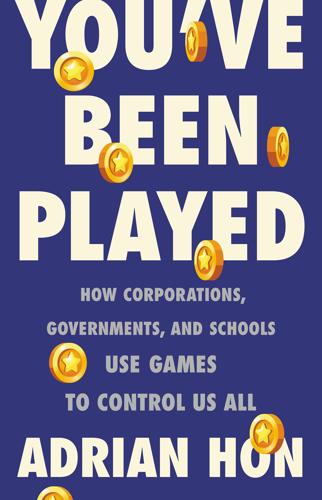
You've Been Played: How Corporations, Governments, and Schools Use Games to Control Us All
by
Adrian Hon
Published 14 Sep 2022
Kyle Hilliard, “Activision Badges—The Original Gaming Achievement,” Game Informer, October 26, 2013, www.gameinformer.com/b/features/archive/2013/10/26/activision-badges-the-original-gaming-achievement.aspx. 20. u/jasonpressX, “The Unity map gives me mini panic attacks every time I look at it,” r/assassinscreed, Reddit, November 15, 2014, www.reddit.com/r/assassinscreed/comments/2mdae2/the_unity_map_gives_me_mini_panic_attacks_every. 21. “Too much grinding in this game,” GameFAQs, GameSpot, Red Ventures, January 3, 2015, https://gamefaqs.gamespot.com/boards/772633-assassins-creed-unity/70945009. 22. Charlie Brooker, “Charlie Brooker in Conversation with Adam Curtis,” VICE, February 11, 2021, www.vice.com/en/article/4ad8db/adam-curtis-charlie-brooker-cant-get-you-out-of-my-head. 23. If you take into account inflation, 2020 games still cost less than those in the ’80s and ’90s. 24. Vikki Blake, “Assassin’s Creed Fans Hit Out at Valhalla’s ‘Extremely Overpriced’ Microtransactions,” Eurogamer, updated February 7, 2021, www.eurogamer.net/articles/2021-02-07-assassins-creed-fans-hit-out-at-valhallas-extremely-overpriced-microtransactions. 25.
…
“Sentiment trader at quant hedge fund,” Cindicator Capital, LinkedIn, accessed November 28, 2021, https://web.archive.org/web/20210301034620/https://www.linkedin.com/jobs/view/sentiment-trader-at-quant-hedge-fund-at-cindicator-2410397759. 76. Charlie Brooker, “Charlie Brooker in Conversation with Adam Curtis,” VICE, February 11, 2021, www.vice.com/en/article/4ad8db/adam-curtis-charlie-brooker-cant-get-you-out-of-my-head. 77. Ryan Broderick, “‘down so bad im 3rd wheeling an e-couple,’” Garbage Day, January 4, 2021, https://www.garbageday.email/p/down-so-bad-im-3rd-wheeling-an-e. 78. Georgia Wells, Jeff Horowitz, and Deepa Seetharaman, “Facebook Knows Instagram Is Toxic for Teen Girls, Company Documents Show,” Wall Street Journal, September 14, 2021, www.wsj.com/articles/facebook-knows-instagram-is-toxic-for-teen-girls-company-documents-show-11631620739. 79.
…
I like this game and franchise but when I saw that map I thought what have they done to me, it is taking forever to get everything, so many chests and it does feel like a grind as you need items or money to get better in the missions as they get harder and harder. this game is not easy thats for sure if you dont grind.”21 Sure enough, one of those die-hards pops in to reply, “I love it. I can pick up the game for like 30min to an hour and just fool around and have fun.” Some players really do enjoy hunting down endless chests and cockades, or at least they find it relaxing (in a Vice interview, the filmmaker Adam Curtis argued it can be calming and liberating).22 And when games are being criticised for their high prices of seventy dollars and above, they don’t mind a bit of padding if it lengthens their potential play time; if you think that one hour spent playing a game is as good as any other hour, then a game with eighty hours of notional gameplay is twice as good as one with forty hours.23 Most would recognise this as a gross oversimplification that ignores quality and variety, yet gamers continue to praise or criticise games for their length and supposed value.
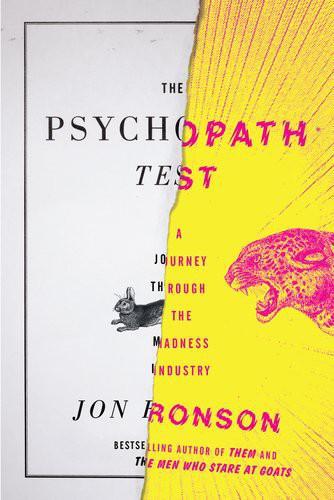
The Psychopath Test: A Journey Through the Madness Industry
by
Jon Ronson
Published 12 May 2011
It makes us look bad: the duller the interviewee, the duller the prose. If you want to get away with wielding true, malevolent power, be boring. 7. THE RIGHT SORT OF MADNESS It was a week after I returned from Florida. I was sitting in a bar in North London with a friend—the documentary maker Adam Curtis—and I was animatedly telling him about Al Dunlap’s crazy sculpture collection of predatory animals and his giant oil paintings of himself and so on. “How’s Elaine dealing with your new hobbyhorse?” Adam asked me. Elaine is my wife. “Oh, she likes it,” I said. “Usually, as you know, she finds my various obsessions quite annoying, but not this time.
…
My wife, Elaine; William Fiennes; Emma Kennedy; and Derek Johns and Christine Glover at AP Watt therefore deserve my biggest thanks. There were four or five pages in the chapter “Night of the Living Dead” that were boring and I needed someone to tell me. Ben Goldacre was happy, maybe a little excessively happy, to do so. Adam Curtis and Rebecca Watson were brilliantly clever sounding boards, as were my editors Geoff Kloske at Riverhead and Paul Baggaley at Picador, and Camilla Elworthy and Kris Doyle. I’m very grateful to Lucy Greenwell for helping to research and set up my Gothenburg trip. I recorded an early version of “The Man Who Faked Madness” for the Chicago Public Radio show This American Life.
…
by Colin Stagg and David Kessler (Greenzone, 1999). Research into DSM-IV and the chapter “The Avoidable Death of Rebecca Riley” took me to four brilliant sources: “The Dictionary of Disorder: How One Man Revolutionized Psychiatry,” by Alix Spiegel (The New Yorker, January 3, 2005); The Trap, by Adam Curtis (BBC Television); “The Encyclopedia of Insanity: A Psychiatric Handbook Lists a Madness for Everyone,” by L. J. Davis (Harper’s, February 1997); and “Pediatric Bipolar Disorder: An Object of Study in the Creation of an Illness,” by David Healy and Joanna Le Noury (The International Journal of Risk & Safety in Medicine, vol. 19, 2007).

The Death of Truth: Notes on Falsehood in the Age of Trump
by
Michiko Kakutani
Published 17 Jul 2018
“If there is something comforting—religious, if you want—about paranoia,” he wrote in Gravity’s Rainbow, “there is still also anti-paranoia, where nothing is connected to anything, a condition not many of us can bear for long.” * * * — In a 2016 documentary titled HyperNormalisation, the British filmmaker Adam Curtis created an expressionistic, montage-driven meditation on life in the post-truth era; the title (which also seems to allude to Baudrillard) was taken from a term coined by the anthropologist Alexei Yurchak to describe life in the final years of the Soviet Union, when people both understood the absurdity of the propaganda the government had been selling them for decades and had difficulty envisioning any alternative.
…
“a secret society of astronomers”: Jorge Luis Borges, Ficciones (New York: Grove Press, 1962), loc. 21–22, 34, Kindle. “Reality gave ground”: Ibid., 33. “If there is something comforting”: Thomas Pynchon, Gravity’s Rainbow (New York: Viking Press, 1973), loc. 434, Kindle. In a 2016 documentary: Brandon Harris, “Adam Curtis’s Essential Counterhistories,” New Yorker, Nov. 3, 2016. “red-pilling the normies”: Alice Marwick and Rebecca Lewis, “The Online Radicalization We’re Not Talking About,” Select All, May 18, 2017. study on online disinformation: Alice Marwick and Rebecca Lewis, Media Manipulation and Disinformation Online, Data and Society Research Institute, May 15, 2017.
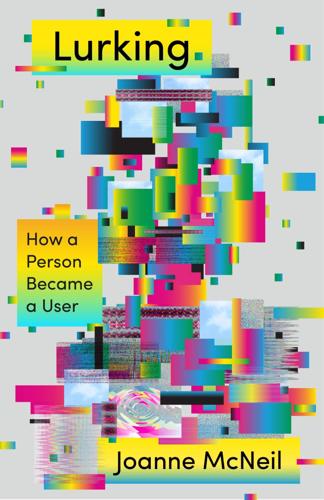
Lurking: How a Person Became a User
by
Joanne McNeil
Published 25 Feb 2020
A short-term result of this might be a decentralized commercial internet, as it was in the nineties—better but still no paradise. In 1994, Carmen Hermosillo, an internet user who went by “humdog,” posted a manifesto to the internet, “pandora’s vox: on community in cyberspace.” It has been widely shared and reblogged ever since. Adam Curtis even quoted the manifesto in his miniseries All Watched Over by Machines of Loving Grace, and talked about the prescience of this text on a 2011 radio show hosted by Jarvis Cocker. “[When] i went into cyberspace i went into it thinking that it was a place like any other place and that it would be a human interaction like any other human interaction,” Hermosillo began, tearing down The WELL’s self-mythologizing as a utopia, and instead painting a picture of cyberspace as large as a vampiric spectacle: i have seen many people spill their guts on-line, and i did so myself until, at last, i began to see that i had commodified myself. commodification means that you turn something into a product which has a money-value. in the nineteenth century, commodities were made in factories, which karl marx called “the means of production.” capitalists were people who owned the means of production, and the commodities were made by workers who were mostly exploited. i created my interior thoughts as a means of production for the corporation that owned the board i was posting to, and that commodity was being sold to other commodity/consumer entities as entertainment. that means that i sold my soul like a tennis shoe and i derived no profit from the sale of my soul. people who post frequently on boards appear to know that they are factory equipment and tennis shoes, and sometimes trade sends and email about how their contributions are not appreciated by management.
…
“i suspect that my words have been extracted and that when this essay shows up, they will be extracted some more,” she concludes. She passed away in 2008, and since then, the prophecy of her words in 1994 has been realized. The text has been posted to VC-backed blog platforms and GitHub. The clip of Jarvis Cocker and Adam Curtis is available on YouTube. Links to this content are shared on Facebook and Twitter regularly. Decentralization isn’t much without a noncommercial mission, but now we’re back to the demand, beneath the gloss of social internet, from cyberspace to social media: How does society dismantle hierarchies, bring about progressive social change, and negate corruption, bias, exploitation, and injustice—problems born online or there all along?
…
Darius Kazemi, writing for the Dat Foundation’s blog, has explained how internet architecture continues to make decentralization possible (“Three protocols and a future of the decentralized internet,” March 22, 2019). The piece “pandora’s vox: on community in cyberspace,” by Carmen Hermosillo, was included in the anthology High Noon on the Electronic Frontier (ed. Peter Ludlow, MIT Press, 1996). It is also widely available online. Adam Curtis appeared on Jarvis Cocker’s Sunday Service on May 22, 2011, to discuss his documentary program All Watched Over by Machines with Loving Grace, which quotes humdog’s manifesto. Kim Stanley Robinson defined utopia in an interview with Amazing Stories (R. K. Troughton, “Interview with Award-Winning Author Kim Stanley Robinson,” September 25, 2013): “One point I’ve been making all along is that even in a utopian situation, there will still be death and lost love, so there will be no shortage of tragedy in utopia.
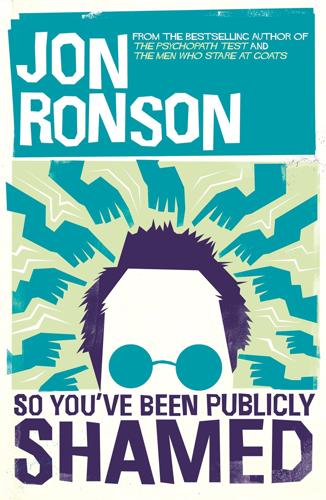
So You've Been Publicly Shamed
by
Jon Ronson
Published 9 Mar 2015
In Goetz’s Wired magazine story - ‘Harnessing the Power of Feedback Loops’ - he calls them ‘a profoundly effective tool for changing behaviour’. And I’m all for people slowing down in school zones. But maybe in other ways feedback loops are leading to a world we only think we want. Maybe - as my friend the documentary maker Adam Curtis emailed me - they’re turning social media into ‘a giant echo chamber where what we believe is constantly reinforced by people who believe the same thing’. We express our opinion that Justine Sacco is a monster. We are instantly congratulated for this - for basically being Rosa Parks. We make the on-the-spot decision to carry on believing it.
…
I learnt about the drink-drivers Mike Hubacek and Kevin Tunell from reading ‘A Great Crime Deterrent’ by Julia Duin, published in Insight on the News on 19 October 1998, and ‘Kevin Tunell Is Paying $1 a Week for a Death He Caused and Finding the Price Unexpectedly High’ by Bill Hewitt and Tom Nugent, published in People magazine on 16 April 1990. I loved piecing together the history of group madness from Gustave Le Bon through to Philip Zimbardo. Five people were incredibly generous with their time and expertise - Adam Curtis, Bob Nye, Steve Reicher, Alex Haslam and, especially, Clifford Stott. Clifford kindly talked me through the perils of deindividuation in two long Skype conversations. I recommend his book, Mad Mobs and Englishmen? Myths and Realities of the 2011 Riots, co-written with Steve Reicher and published by Constable & Robinson in 2011.
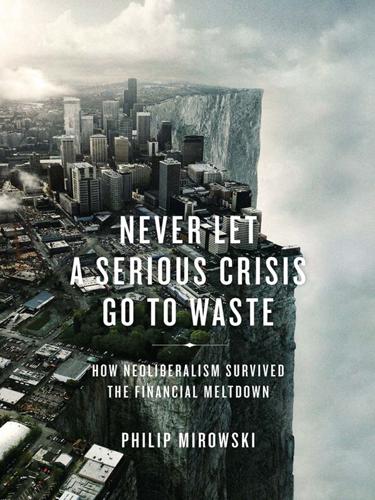
Never Let a Serious Crisis Go to Waste: How Neoliberalism Survived the Financial Meltdown
by
Philip Mirowski
Published 24 Jun 2013
Gales of merriment apparently rocked the meetings of the Federal Reserve Open Market Committee, as revealed by a tabulation of all the recorded instances of stipulated “[laughter]” in meetings transcripts from 2001 to 2006, reproduced in Figure 1.1.14 Figure 1.1: Hilarity at the Federal Reserve * * * * * * Source: Federal Reserve FOMC Transcripts, Graph created by Daily Stag Hunt Sometimes the best response to crisis fatigue is not an injunction to recover your flagging sense of humor, or to aspire to the status of he who laughs last. Levity might not be a universal nostrum. The filmmaker Adam Curtis has written in disgust, “Despite the disasters we are [still] trapped in the economists’ world.”15 Yet it will become necessary for us to differentiate the world of the economists and the world of the neoliberals. This conflation is an affliction of many on the left. A major sticking point here is that neoliberals themselves generally do not believe in the comic-book version of laissez-faire sometimes promoted by the economists.
…
Andrew Lo lecture: “Are Mathematical Models the Cause for the Financial Crisis in the Global Economy?” (2009). Nolan, Christopher. Memento (2001). Oldham, Taki. (Astro)Turf Wars (2010). Notes 1. One More Red Nightmare 1 For those with access to a film library, I would suggest The Descent (2006); or for something closer to the current topic, Adam Curtis’s The Trap (2007). Just when I had begun feeling proud of my little trope, a friend pointed me to Wendy Brown’s “American Nightmare: Neoliberalism, Neoconservatism, and De-democratization.” Originality is an overrated virtue. 2 Video recordings of much of the proceedings are available on the Web at www.ineteconomics.org. 3 Kay, “The Map Is Not the Territory.” 4 Tankersley and Hirsh, “Neo–Voodoo Economics.” 5 Tiago Mata, at History of Economics Playground, at http://historyofeconomics.wordpress.com/2011/04/10/inet-bw-of-history-repeating/#more-2002. 6 Stephan Richter, www.theglobalist.com/storyid.aspx?
…
This point is reprised in chapter 6, which proposes that this was a conscious outcome. 13 This story is still developing: www.huffingtonpost.com/2013/03/12/aig-hank-greenberg-lawsuit-bailout_n_2862195.html 14 Tabulated and graphed at www.dailystaghunt.com/markets/2012/1/12/the-correlation-of-laughter-at-fomc-meetings.html#entry14562168. 15 Adam Curtis,“The Economists’ New Clothes,” www.bbc.co.uk/blogs/adamcurtis/2010/02/the_economists_new_clothes.html. 16 Tkacik, “Journals of the Crisis Year.” 17 The quote is from Ezra Klein, “What ‘Inside Job’ Got Wrong.” Yves Smith at nakedcapitalism.com immediately responded to this attack on the movie with a riposte that will be expanded upon in this book: “This is worse than useless, since Klein incorrectly throws up his hands and effectively says no one can understand what happened and therefore there’s no answer.
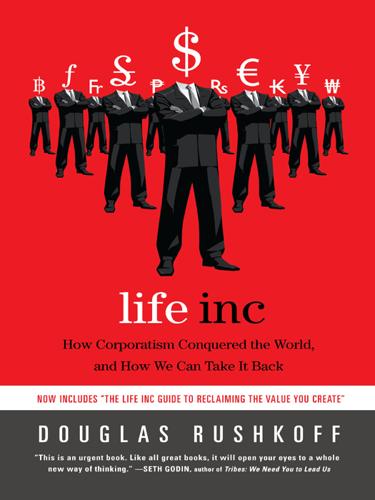
Life Inc.: How the World Became a Corporation and How to Take It Back
by
Douglas Rushkoff
Published 1 Jun 2009
Air Force in 1943, and then spun off as a nonprofit corporation in 1948. The official Rand site is http://www.rand.org/. 151 They tested their ideas on Oliver Burkeman, “Cry Freedom,” The Guardian, March 3, 2007. 152 “It is understood not to be” John Nash spoke to filmmaker Adam Curtis in the BBC documentary The Trap, dir. Adam Curtis (United Kingdom: BBC Two, 2007). 152 The Scottish psychologist R. D. Laing Laing had some evidence on his side. In the infamous “Rosenhan Experiment,” fake patients went to psychiatric institutions and managed to get faulty diagnoses as suffering from mental disorders.
…
(New York: Random House, 1998), 46. 136 “tailored more than any” William Leach, Land of Desire: Merchants, Power, and the Rise of a New American Culture (New York: Vintage Books, 1994), 201. 136 Instead, everyone should just avoid Ibid., 204. 138 “We want to live a life” Century of the Self, dir. Adam Curtis (United Kingdom: BBC Four, 2002). 138 To this end, in 1962 For a detailed history of Esalen, see Jeffrey J. Kripal, Esalen: America and the Religion of No Religion (Chicago: University of Chicago Press, 2007). 139 The Brooklyn-born psychologist’s Abraham H. Maslow, Toward a Psychology of Being, 3rd ed.

Surveillance Valley: The Rise of the Military-Digital Complex
by
Yasha Levine
Published 6 Feb 2018
In 1971, a special issue of the magazine topped best-seller book lists and won a National Book Award. Yet, despite the cultural and financial success, Brand faced an identity crisis. By the time Whole Earth won the National Book Award, the commune movement it served and celebrated lay in ruins. Years later, filmmaker Adam Curtis interviewed former members of communes in his BBC documentary All Watched Over by Machines of Loving Grace. He discovered that the cybernetic structures that these groups imposed on themselves, rules that were supposed to flatten and equalize power relations among members and lead to a harmonious new society, produced the opposite result and, ultimately, ripped many of the communities apart.20 “We were trying to create a society based on understanding eco-systems, a society based on interrelationships and balance—a man machine biological system working in combination,” recalled Randall Gibson, a member of the Synergia commune in New Mexico that ran on a cybernetic notion he called eco-technics.21 The community had strict rules against collective action or organization.
…
A founding member who called himself Lord Byron presided over the group and reserved the right to have sex with any woman in the commune.24 Most communes lasted only a few years, and some less than that. “What tore them all apart was the very thing that they were supposed to have banished: power,” explained Adam Curtis. “Strong personality came to dominate the weaker members of the group, but the rules of a self-organizing system refused to allow any organized opposition to this oppression.” In the end, what were supposed to be experiments in freedom and new utopian societies simply replicated and magnified the structural inequality of the outside world that people brought with them.
…
(New York: Grove Press, 1994), 155–156. 15. Ibid., 109. 16. Turner, From Counterculture to Cyberculture, 4. 17. Ibid. 18. “Steve Jobs’ Commencement address,” YouTube video, 15:04, June 12, 2005, posted March 7, 2008, https://www.youtube.com/watch?v=UF8uR6Z6KLc. 19. Turner, From Counterculture to Cyberculture, 71–72. 20. Adam Curtis, All Watched Over by Machines of Loving Grace (London: BBC, 2011), documentary series. 21. The founder of Synergia would go on to lead the Biosphere, a project to create a self-sustaining ecosystem inside a giant glass bowl, which was financed by Edward P. Bass, an oil heir from Texas who had been a member of Synergia in the 1970s.
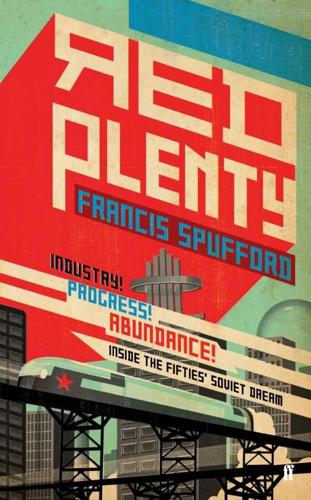
Red Plenty
by
Francis Spufford
Published 1 Jan 2007
Deputy Director of the Sector of Chemical and Rubber Goods was a real job, but the relationship I have suggested between professional-bureaucrat deputies and political-appointee sector directors is conjectural, and I have no knowledge of anyone being called up from the middle ranks to serve in a ‘kitchen cabinet’ for the Minister, as Mokhov does here. He is acting in this book as a confabulated embodiment of the institution. His tone of voice draws on the exasperated Gosplan witness in Ellman and VolodyaKontorovich, eds, The Destruction of the Soviet Economic System, and on the Gosplan official interviewed in Adam Curtis’s TV documentary ‘The Engineers’ Plot’, programme 1 of Pandora’s Box, BBC TV 1992; but also, and especially on his return in part V chapter 2, on Dostoevsky’s Grand Inquisitor in The Brothers Karamazov. There’s also useful material on official attitudes (at different levels) to property, in Hachten, Property Relations. 2 When he handed out the traditional bouquets on Women’s Day: International Women’s Day was celebrated (and still is in present-day Russia) on 8 March, with this flower-giving tradition by men as a kind of courtly grave-marker for the early Soviet Union’s feminism. 3 For chemicals were a vital sector at present: for the rapid build-up of the chemical industry, see Theodore Shabad, Basic Industrial Resources of the USSR (New York: Columbia University Press, 1969). 4 ‘Suppressed inflation’ or a ‘permanent sellers’ market’: two linked phenomena, though the first chiefly affected the Soviet Union’s perpetually low-priority consumer sector, and the second was true of the cherished industrial sector too.
…
Deputy Director of the Sector of Chemical and Rubber Goods was a real job, but the relationship I have suggested between professional-bureaucrat deputies and political-appointee sector directors is conjectural, and I have no knowledge of anyone being called up from the middle ranks to serve in a ‘kitchen cabinet’ for the Minister, as Mokhov does here. He is acting in this book as a confabulated embodiment of the institution. His tone of voice draws on the exasperated Gosplanperimess in Ellman and VolodyaKontorovich, eds, The Destruction of the Soviet Economic System, and on the Gosplan official interviewed in Adam Curtis’s TV documentary ‘The Engineers’ Plot’, programme 1 of Pandora’s Box, BBC TV 1992; but also, and especially on his return in part V chapter 2, on Dostoevsky’s Grand Inquisitor in The Brothers Karamazov. There’s also useful material on official attitudes (at different levels) to property, in Hachten, Property Relations. 2 When he handed out the traditional bouquets on Women’s Day: International Women’s Day was celebrated (and still is in present-day Russia) on 8 March, with this flower-giving tradition by men as a kind of courtly grave-marker for the early Soviet Union’s feminism. 3 For chemicals were a vital sector at present: for the rapid build-up of the chemical industry, see Theodore Shabad, Basic Industrial Resources of the USSR (New York: Columbia University Press, 1969). 4 ‘Suppressed inflation’ or a ‘permanent sellers’ market’: two linked phenomena, though the first chiefly affected the Soviet Union’s perpetually low-priority consumer sector, and the second was true of the cherished industrial sector too.
…
Ziegelbaum, Jet Propulsion Laboratory/Astronautics Information Translation 22, 1 May 1961 (JPL, Calfornia Institute of Techology) – Gagarin’s first flight Life Magazine vol. 47 no. 6 (10 August 1959), pp. 28–35 – pictures of the American exhibition Literaturnaya Gazeta no. 27 (1969), p. 10 – trial of deputy director of pig farm New York Times vol. 108 no. 37,072 (25 July 1959), pp. 1–4 – Khrushchev and Nixon’s ‘kitchen debate’ at the American exhibition Time Magazine, 12 February 1965, ‘Borrowing from the Capitalists’ – Liberman and economic reform Websites Banknotes http://commons.wikipedia.org/wiki/Category: Banknotes_of_the_Soviet_ Union,_1961 Russian cars www.autosoviet.com Alexander [Aleksandr] Galich www.galichclub.narod. ru/biog. htm The Jewish Women’s Archive http://jwa.org/encyclopedia/article/berg-raissa-lvovna Soviet literature www.sovlit.com Michael Swanwick’s blog http://floggingbabel.blogspot.com/2008/02/khrushchev-isnt-he-russian-novelist. html [sic] Unrealised Moscow http://www.muar.ru/ve/2003/moscow/index_e. htm Film and television Adam Curtis, dir., ‘The Engineers’ Plot’ (TV documentary), programme 1 of Pandora’s Box, BBC TV 1992 Georgii Daniela, dir., Ya shagayu po Moskve (‘I Walk around Moscow’), 1964 Marlen Khutsiev, dir., Zastava Ilicha/Mne Dvadtsat’ Let (‘Ilich’s Gate’/‘I Am Twenty’), 1961 released 1965 Marlen Khutsiev, dir., Iyulskii Dozhd’ (‘July Rain’), 1967 Mikhail Romm, dir., Devyat’ dnei odnogo goda (‘Nine Days in One Year’), 1962 About the Author Francis Spufford, a former Sunday Times Young Writer of the Year (1997), has edited two acclaimed literary anthologies and a collection of essays about the history of technology.
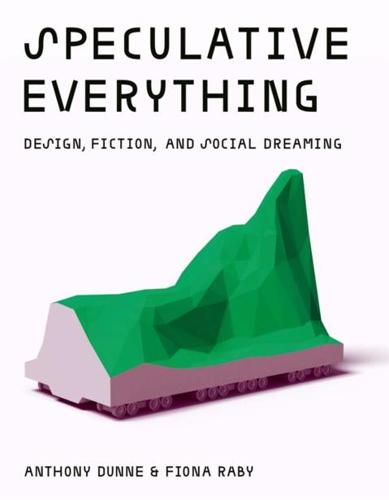
Speculative Everything: Design, Fiction, and Social Dreaming
by
Anthony Dunne
and
Fiona Raby
Published 22 Nov 2013
Joseph Popper, The One-Way Ticket, 2012. Film still. SOCIAL DREAMING The social dimension to big thinking has vanished, replaced by science, technology, and logic. Where can new worldviews be developed, how can they be used to generate new visions for everyday life? Think tanks are supposed to do this, but as Adam Curtis writes, the question is whether most Think Tanks may actually be preventing people thinking of new visions of how society could be organised-and made fairer and freer. That in reality they have become the armoured shell that surrounds all politics, constantly setting the agenda through their PR operations which they then feed to the press, and that prevents genuinely new ideas breaking through.13 Other organizations such as The Seasteading Institute try to develop new possibilities within existing systems by identifying legal loopholes for establishing new economic zones.
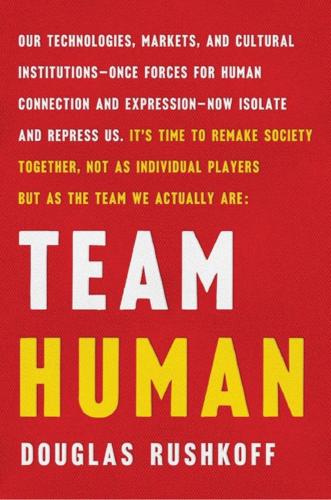
Team Human
by
Douglas Rushkoff
Published 22 Jan 2019
marketing psychologists saw in [television] a way to mirror a consumer’s mind W. R. Simmons, “Strangers into Customers,” marketing study prepared for National Broadcasting Co., New York, 1954. Television told people they could choose their own identities David Halberstam, The Fifties (New York: Ballantine, 1993). The Century of the Self, film, directed by Adam Curtis (2005; United Kingdom: BBC Two, RDF Television). Stuart Ewen, All-Consuming Images (New York: Basic Books, 1990). Television was widely credited as the single biggest contributor to the desocialization of the American landscape Robert D. Putnam, Bowling Alone: The Collapse and Revival of American Community (New York: Simon and Schuster, 2000). 19.
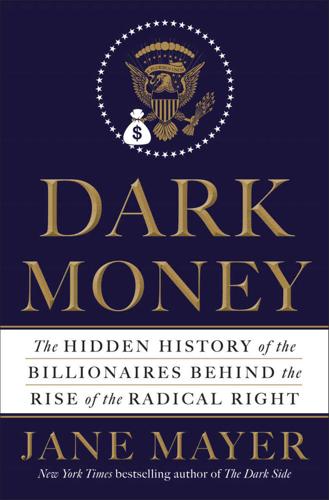
Dark Money: The Hidden History of the Billionaires Behind the Rise of the Radical Right
by
Jane Mayer
Published 19 Jan 2016
Eric Wanner, the former president of the Russell Sage Foundation, summed it up, saying, “The AEIs and the Heritages of the world represent the inversion of the progressive faith that social science should shape social policy.” According to one account, it was Hayek who spawned the idea of the think tank as disguised political weapon. As Adam Curtis, a documentary filmmaker with the BBC, tells the story, around 1950, after reading the Reader’s Digest version of Hayek’s Road to Serfdom, an eccentric British libertarian named Antony Fisher, an Eton and Cambridge graduate who believed socialism and Communism were overtaking the democratic West, sought Hayek’s advice about what could be done.
…
Leaders of conservative foundations such as William Simon might have perceived themselves as merely providing political balance and copying the activism of liberal foundations, but the political scientist Steven Teles pointed out in an interview with the author that there were key differences. The boards of the earlier establishment foundations such as Ford tended to be centrist, while those at the new conservative foundations like Olin tended, he says, to be “ideologically-aligned” and more likely to embrace grant making as a form of movement building. “a scholarly institute”: Adam Curtis, “The Curse of Tina,” BBC, Sept. 13, 2011. The Sarah Scaife Foundation: Martin Gottlieb, “Conservative Policy Unit Takes Aim at New York,” New York Times, May 5, 1986. “As you well know”: L. L. Logue to Frank Walton (Heritage Foundation), Nov. 16, 1976, folder 16, Weyrich Papers, University of Montana
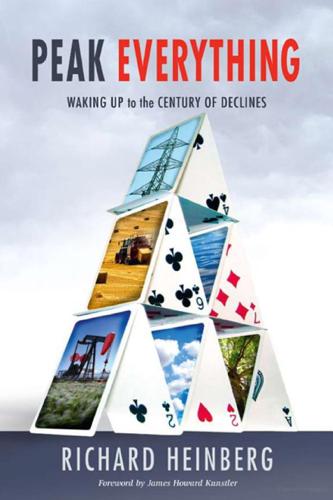
Peak Everything: Waking Up to the Century of Declines
by
Richard Heinberg
and
James Howard (frw) Kunstler
Published 1 Sep 2007
Meanwhile, at the business end of economic theory, masters of advertising, marketing, and public relations have learned deftly to manipulate symbols and images for emotional effect, sculpting the public’s aspirations for comfort and prestige. This new kind of magical thinking did contribute to commerce and industry — and spectacularly so! (For historical details on this, see the BBC television documentary series “Century of Self ” by Adam Curtis, and the books of Stuart Ewen.) In politics, the 20th century saw battles between the quasi-religious ideologies of the left and right — Leninism, Stalinism, Fascism, Nazism, and Maoism, along with British “it’s-for-your-own-good” colonialism and equally benevolent Yankee imperialism. In recent years, the political philosophy of Leo Strauss and his followers has come to the fore via the neoconservative members of the current Bush administration.

Them: Adventures With Extremists
by
Jon Ronson
Published 1 Jan 2001
I would also like to thank Janey Walker, Tim Gardam, Janet Lee, Janis Hadlow, Steve McCarthy, David Malone, Emily Fielden, Natasha Fownes, Mike Whine, Vivienne Clore, Sam Bickley and Emma Forrest. I would say that my wife, Elaine, possessed all the patience and understanding of a loving wife, etc., but in fact she just said to me: ‘Oh, will you just shut up about it and finish it.’ The loving wife in this situation was Adam Curtis. All the words within are my own, except for the paragraphs I have appropriated from Neal Gabler’s An Empire Of Their Own (How The Jews Invented Hollywood). Shorter versions of A Semi-Detached Ayatollah and Dr Paisley, I Presume were published in the Guardian Weekend magazine (in 1997 and 1998).
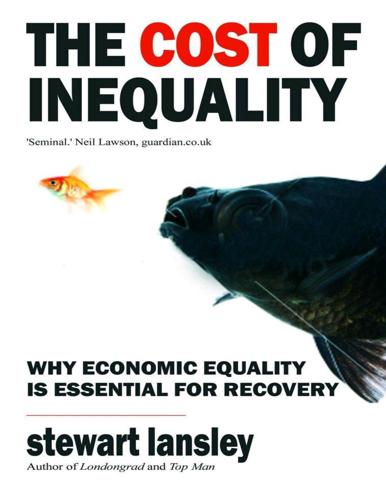
The Cost of Inequality: Why Economic Equality Is Essential for Recovery
by
Stewart Lansley
Published 19 Jan 2012
Because of changes in definitions, the series before and after 1970 are not strictly comparable. 88 For the 1950s to the 1980s, Social Justice, Report of the Social Justice Commission, Vintage, 1994; for the 1990s and 2000s, ONS; http://www.statistics.gov.uk/elmr/03_10/downloads/Table2_09.xls. 89 P Edwards, Non-standard work and labour-market restructuring in the UK, Warwick Business School, 2006. 90 R Taylor, Britain’s World of Work, ESRC, 2002. 91 TUC, Hardwork, Hidden Lives, Report on Commission on Vulnerable Employment, 2008. 92 Ibid. p 17. 93 Interview in Adam Curtis, The League of Gentlemen, BBC2, 1992. 94 See, eg, R E Rowthorn & JR Wells, De-Industrialisation & Foreign Trade, CUP, 1987, ch 10. 95 Glyn, Capitalism Unleashed, op. cit. p 98. 96 The New York Times, 11 November 1984. 97 H Perkin, The Third Revolution, Routledge, 1996, p 37. 98 Glyn op. cit. p 135. 99 Tom Nairn, The Break Up of Britain, 1981, p 392. 100 I Gilmour, Dancing With Dogma, Pocket Books, 1993, p 71. 101 RW Johnson, The Politics of Recession, Palgrave Macmillan, 1985, p 29. 102 Quoted in Gilmour, op. cit., p 70. 103 ONS Workforce Jobs, by industry: http://www.statistics.gov.uk/downloads/theme_labour/LMS_FR_HS/WebTable05_2.xls; there was also a rise in the size of the workforce over the period. 104 If business services are included (legal, accountancy and business consultancy), the figures for 2007 and 2006 rise to 14.5 per cent and 13.8 per cent respectively. 105 S Lansley, Do The Super-Rich Matter?
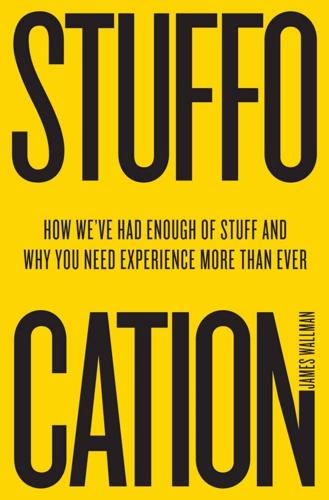
Stuffocation
by
James Wallman
Published 6 Dec 2013
To understand the birth of consumerism, read Mark Tungate, Adland: A Global History of Advertising (London: Kogan Page, 2007, second edition 2013), Frank Trentmann (ed.), The Oxford Handbook of the History of Consumption (Oxford: Oxford University Press, 2012), Grant McCracken, Culture and Consumption (Bloomington: Indiana University Press, 1988), Jan de Vries, The Industrious Revolution (Cambridge: Cambridge University Press, 2008). The scene from Hoover’s life was inspired by “Happiness Machines” and “The Engineering of Consent”, A Century of the Self, Adam Curtis, BBC, 2002, television. It was informed by “Hoover Sees Prosperous Era”, Houston Post Despatch, 11 May 1925, and “Advertising Is a Vital Force, Says Hoover”, Boston Daily Globe, 11 May 1925. Thank you to the “Quote Investigator”, Garson O’Toole, and to Spencer Howard, archives technician at the Hoover Presidential Library, for making sure the quotes in Stuffocation are correct.
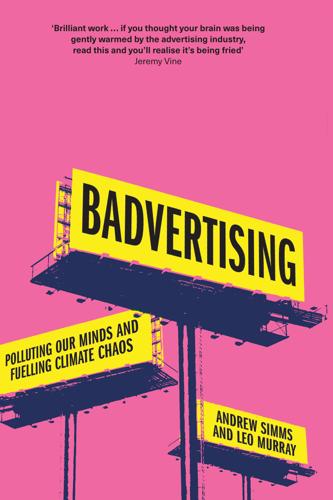
Badvertising
by
Andrew Simms
In the mass production of materials a broad technique has been developed and applied to their distribution’, he wrote in an article called ‘Manipulating public opinion’.54 ‘In this age, too, there must be a technique for the mass distribution of ideas.’ Bernays has had a bad press since he died in 1995 at the age of 103. This is partly because of his treatment by the documentary-maker Adam Curtis.55 But he also received criticism in his lifetime. He was described by one academic as a ‘Pluto-gogue’ – defined as ‘“the voice of the wealthy when they can no longer speak for themselves,” the successor of the plutocrat of other days …’56 Bernays was also horrified to find out that Goebbels was using his 1923 book Crystallizing Public Opinion as a basis for his genocidal campaign against Jewish people in Germany.57 In fact, he was concerned about democracy, as he said in his 1940 book Speak out for Democracy.

Vassal State
by
Angus Hanton
Published 25 Mar 2024
(A beginner’s guide)’, Asana [website] (15 October 2022), https://asana.com/resources/agile-methodology. 36 See, for instance, ‘JIT just-in-time manufacturing’, University of Cambridge [website], https://www.ifm.eng.cam.ac.uk/research/dstools/jit-just-in-time-manufacturing/. 37 ‘Marshall Field (1834–1906)’, American Experience [website], https://www.pbs.org/wgbh/americanexperience/features/chicago-marshall-field-1834-1906/. 38 Quoted in Charles Arthur, ‘Walled gardens look rosy for Facebook, Apple – and would-be censors’, Guardian (17 April 2012), https://www.theguardian.com/technology/2012/apr/17/walled-gardens-facebook-apple-censors. 39 Keshav Thakur, ‘Gillette’s razor-sharp success: how a simple strategy built a business empire’, LinkedIn [website] (22 November 2023), https://www.linkedin.com/pulse/gillettes-razor-sharp-success-how-simple-strategy-built-keshav-thakur-z1yyf/. 40 ‘EG Group reaches deal to buy Tesla Superchargers for its forecourts’, Car (14 November 2023), https://www.carmagazine.co.uk/electric/charging-network/tesla-supercharger/. 41 ‘Market share held by mobile operating systems in the United Kingdom (UK) from January 2018 to July 2023’, Statista [website] (4 September 2023), https://www.statista.com/statistics/934440/market-share-held-by-mobile-operating-systems-in-the-united-kingdom/. 42 Denny Ludwell, America Conquers Britain: A Record of Economic War (New York: A. A. Knopf, 1930). 12. Puppet Masters 1 Quoted in the fifth episode of An Ocean Apart (1988), a BBC documentary series presented by David Dimbleby and produced by Adam Curtis (9 minutes, 20 seconds in). 2 ‘Edward Colin Cherry’, MacTutor History of Mathematics Archive [website], https://mathshistory.st-andrews.ac.uk/Biographies/Cherry_Colin/. 3 E. C. Cherry, ‘Some experiments on the recognition of speech, with one and two ears’, Journal of the Acoustical Society of America 25 (1953), pp. 975–9, doi: 10.1121/1.1907229. 4 Maegan Vazquez and Nikki Carvajal, ‘Trump ponders tariffs on French wines in retaliation for tech company tax’, CNN [website] (26 July 2019), https://edition.cnn.com/2019/07/26/politics/donald-trump-france-wine-tariff/index.html. 5 Quoted in Sam Coates, ‘Brexit: Joe Biden’s ties to Ireland “could see him intervene if talks turn acrimonious”’, Sky News [website] (2 November 2020), https://news.sky.com/story/brexit-joe-bidens-ties-to-ireland-could-see-him-intervene-if-talks-turn-acrimonious-12120863. 6 ‘Embassy of the United States of America, London’, LinkedIn [website], https://www.linkedin.com/company/us-embassy-london/about/. 7 Arnaud Bertrand, ‘Incredible, and maybe even unprecedented, answer by Arnaud Montebourg […] But for Americans it is the law to do so!’
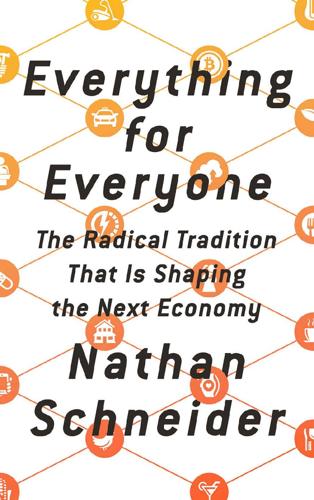
Everything for Everyone: The Radical Tradition That Is Shaping the Next Economy
by
Nathan Schneider
Published 10 Sep 2018
Highly recommended: Marjorie Kelly, Owning Our Future: The Emerging Ownership Revolution (Berrett-Koehler Publishers, 2012); Managed by Q, “Managed by Q Stock Option Program Press Conference,” (March 18, 2016), vimeo.com/159580593. 18. See platform.coop for the conferences and the consortium, and ioo.coop for the directory. For my use of “ecosystem,” apologies to Adam Curtis (dir.), All Watched Over by Machines of Loving Grace, BBC (2011). 19. E.g., selfhosted.libhunt.com and ioo.coop/clouds. 20. Anand Sriraman, Jonathan Bragg, and Anand Kulkarni, “Worker-Owned Cooperative Models for Training Artificial Intelligence,” CSCW ’17 Companion (February 25–March 1, 2017). 21.
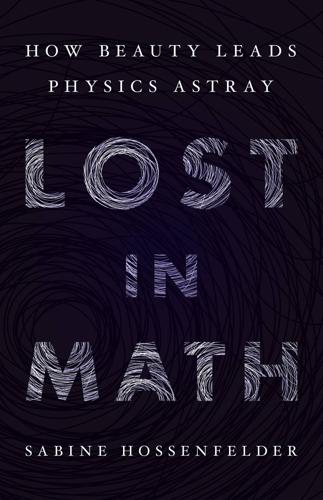
Lost in Math: How Beauty Leads Physics Astray
by
Sabine Hossenfelder
Published 11 Jun 2018
“Rencontres avec A. Einstein.” Revue des Questions Scientifiques 129:129–132. Cited in Nussbaumer H. 2014. “Einstein’s conversion from his static to an expanding universe.” EPJH 39:37–62. 30. Obituary, Professor Sir Fred Hoyle. Telegraph, August 22, 2001. 31. Curtis A. 2012. “A mile or two off Yarmouth.” Adam Curtis: the medium and the message, February 24, 2012. www.bbc.co.uk/blogs/adamcurtis /entries/512cde83-3afb-3048-9ece-dba774b10f89. 32. Vortex theory has been covered in: Kragh H. 2002. “The vortex atom: a Victorian theory of everything.” Centaurus 44:32–114; Kragh H. 2011. Higher speculations. Oxford, UK: Oxford University Press. 33.
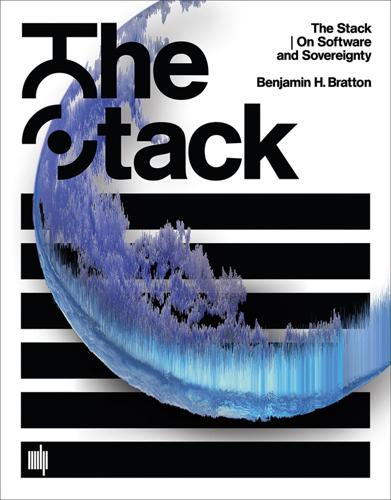
The Stack: On Software and Sovereignty
by
Benjamin H. Bratton
Published 19 Feb 2016
“A new cybernetic communism, itself one of these options, would, we have seen, involve some of the following elements: use of the most advanced super-computing to algorithmically calculate labour time and resource requirements, at global, regional and local levels, of multiple possible paths of human development; selection from these paths by layered democratic discussion conducted across assemblies that include socialized digital networks and swarms of software agents; light-speed updating and constant revision of the selected plans by streams of big data from production and consumption sources; the passage of increasing numbers of goods and services into the realm of the free or of direct production as use values once automation, copy-left, peer-to-peer commons and other forms of micro-replication take hold; the informing of the entire process by parameters set from the simulations, sensors, and satellite systems measuring and monitoring the species metabolic interchange with the planetary environment.” Nick Dyer-Witheford, “Red Plenty Platforms,” Culture Machines, July 28, 2013, http://www.culturemachine.net/index.php/cm/article/view/511/526. 58. As well as a partial corrective, perhaps, to Adam Curtis's tendentious narrative All Watched Over by Machines of Loving Grace (BBC Productions, 2011). 59. This is drawn on our white board as a syncretic thought experiment because of, not in spite of, the complexities and contradictions it makes visible. Among the two most salient are, first, that no actual platform ever functions in an ideal manner and so simply transposing state or corporate governance into platforms does not guarantee specific outcomes, and, second, that the data with which any platform might govern do not merely exist in the world to be gathered and then presented to political systems for their application; rather the identification, sensing, sorting, application, revelation, and instrumentalization of data is the political system in this context.
…
A psychiatrist was brought in to see if they had gone insane, but concluded simply that it was a struggle for power. Then millions of ants appeared from nowhere and waged war on the cockroaches. In 1993 the experiment collapsed in chaos and hatred.” A. Curtis, “How the ‘Ecosystem’ Myth Has Been Used for Sinister Means,” The Guardian, May 28, 2011. See http://www.theguardian.com/environment/2011/may/29/adam-curtis-ecosystems-tansley-smuts. 7. Even though the UN's 1967 Outer Space Treaty stated that no country could claim the moon, Dennis Hope sold pieces of it anyway. Hope is the owner of the “Lunar Embassy Corporation” and has sold plots of moon land to 3.7 million people since 1980. The Nevada entrepreneur believed that he could claim the moon under the guise of a galactic government that he created.
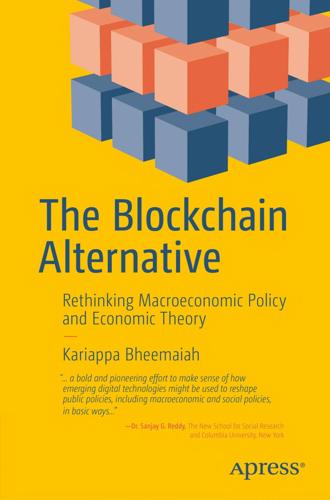
The Blockchain Alternative: Rethinking Macroeconomic Policy and Economic Theory
by
Kariappa Bheemaiah
Published 26 Feb 2017
But there were also other consequences. As interest rates rose massively, this decimated the manufacturing industries of these countries. Highly paid skilled jobs were replaced by low-wage jobs in the service industries. These socioeconomic changes were best reported by English journalist and documentary filmmaker Adam Curtis in the documentary series The Mayfair Set and Bitter Lake (see Note below). In the process of finding a solution, governments once again turned to the commercial banks and relaxed lending restrictions. If wages could not rise any more, then the banks could lend money. The result was a wave of borrowing that spread through these countries.
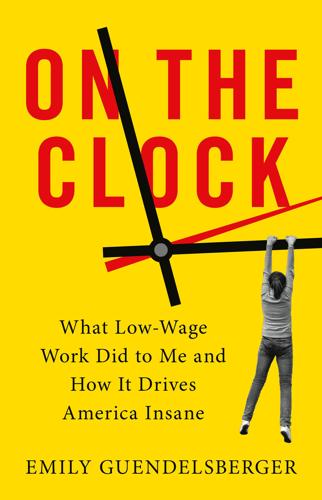
On the Clock: What Low-Wage Work Did to Me and How It Drives America Insane
by
Emily Guendelsberger
Published 15 Jul 2019
Stiglitz, Amartya Sen, and Jean-Paul Fitoussi Hand to Mouth: Living in Bootstrap America, Linda Tirado Why Zebras Don’t Get Ulcers, Robert Sapolsky Temp: How American Work, American Business, and the American Dream Became Temporary, Louis Hyman Private Government: How Employers Rule Our Lives (and Why We Don’t Talk About It), Elizabeth Anderson Labor and Monopoly Capital: The Degradation of Work in the Twentieth Century, Harry Braverman The New Ruthless Economy: Work and Power in the Digital Age, Simon Head Do What You Love: And Other Lies About Success and Happiness, Miya Tokumitsu HyperNormalisation (film), Adam Curtis On workplaces in this book The Everything Store: Jeff Bezos and the Age of Amazon, Brad Stone Fast Food, Fast Talk: Service Work and the Routinization of Everyday Life, Robin Leidner The Furniture Wars: How America Lost a Fifty Billion Dollar Industry, Michael K. Dugan Closing: The Life and Death of an American Factory, Cathy N.

The Immortal Life of Henrietta Lacks
by
Rebecca Skloot
Published 2 Feb 2010
It was this immortality, and the strength with which Henrietta’s cells grew, that made it possible for HeLa to take over so many other cultures—they simply outlived and outgrew any other cells they encountered. 28 After London The story of Henrietta Lacks eventually caught the attention of a BBC producer in London named Adam Curtis, and in 1996, he began making the documentary about Henrietta that I would later watch in Courtney Speed’s beauty parlor. When Curtis arrived in Baltimore with his assistants and cameras and microphones, Deborah thought everything would change, that she and the rest of the world would learn the true story of Henrietta Lacks and the HeLa cells, and she would finally be able to move on.
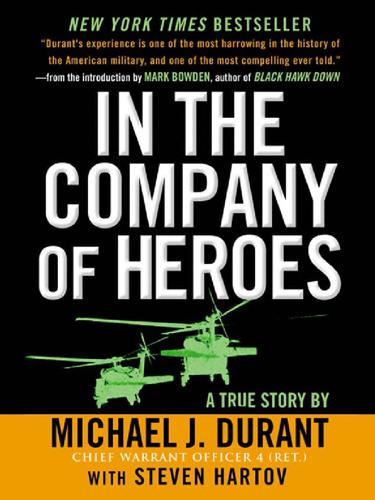
In the Company of Heroes
by
Michael J. Durant
and
Steven Hartov
Published 1 Dec 2006
When members of the Policia Na-cionale began beating on the car with batons and hauling on the door handles, the young Americans concluded that they were about to disappear into one of Noriega’s notorious dungeons—forever. The driver hit the gas pedal and the Panamanians opened fire, killing Marine First Lieutenant Robert Paz. It hadn’t ended there. An American Navy lieutenant, Adam Curtis, had witnessed the shooting incident along with his wife. Both of them were dragged off to the Commandancia for interrogations. While Mrs. Curtis was forced to “assume the position” against a prison cell wall and repeatedly threatened with rape, her husband was gagged, pistol-whipped, and kicked in the groin right in front of her.
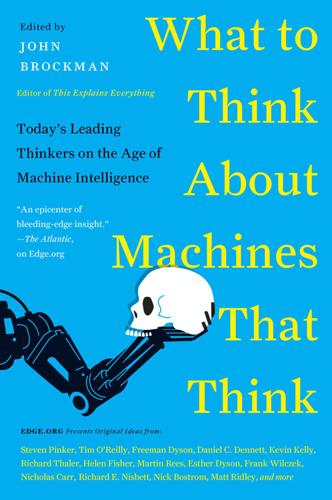
What to Think About Machines That Think: Today's Leading Thinkers on the Age of Machine Intelligence
by
John Brockman
Published 5 Oct 2015
It’s time for our thinking machines to grow out of an adolescence that has lasted now for sixty years. THE FUTURE IS BLOCKED TO US HANS ULRICH OBRIST Codirector of Exhibitions and Programmes, director of International Projects, Serpentine Galleries, London; author, Ways of Curating In his poem of the same name (which also serves as the title to Adam Curtis’s seminal documentary), Richard Brautigan portends a future “all watched over by machines of loving grace” or, by implication, “thinking” machines. In what follows, I use the term thinking to refer to machines that think on purely algorithmic and computational lines—machines coded by engineers rather than machines that might, or could be, truly sentient.
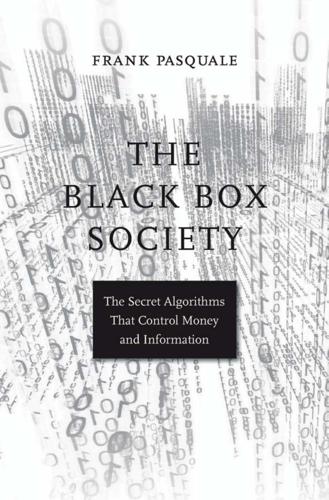
The Black Box Society: The Secret Algorithms That Control Money and Information
by
Frank Pasquale
Published 17 Nov 2014
Elahe Izadi, “Exclusive: AHIP Gave More than $100 Million to Chamber’s Efforts to Derail Health Care Reform,” National Journal (blog), June 13, 2012, http://www.nationaljournal.com /blogs /inf luencealley /2012 /06 /exclusive -ahip -gave -more -than -100 -million -to -chamber-s-efforts-to-derail-health-care-reform-13. 30. Shane Richmond, “Eric Schmidt: Google Gets Close to the ‘Creepy Line,’ ” The Telegraph, October 5, 2010. 31. Magazines like McClure’s paved the way for muckrakers and reformers like Brandeis. Adam Curtis, “What the Fluck?” BBC Blog, December 5, 2013, http://www.bbc.co.uk /blogs/adamcurtis/posts/WHAT-THE-FLUCK. Curtis also observes the need for such exposure and explanation in our day, explaining that scandals “range from the NSA [U.S. National Security Agency] and GCHQ [Britain’s Government Communications Headquarters], to global banks, private equity . . . and parts of the media-industrial complex. . . .
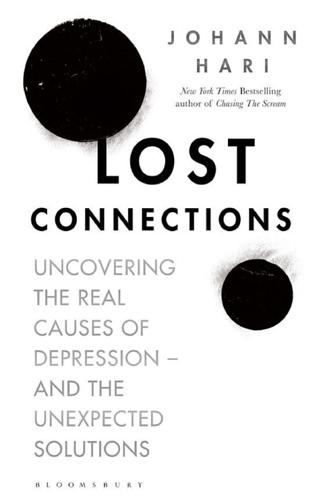
Lost Connections: Uncovering the Real Causes of Depression – and the Unexpected Solutions
by
Johann Hari
Published 1 Jan 2018
See: Book of Woe (New York: Penguin, 2013), 6, 158–60; Manufacturing Depression: The Secret History of a Modern Disease (London: Bloomsbury, 2010), 246–8; John Read and Pete Sanders, A Straight-Talking Introduction to the Causes of Mental Health Problems (Herefordshire, UK: PCCS Books, 2013), 60, 88–91. But once you’ve conceded that One of the leading authors of the fourth edition of the DSM, Robert Spitzer, tacitly admitted this. See The Therapy Trap, p. 49, and my friend Adam Curtis’s BBC documentary The Trap. “we don’t consider context.” Other key figures in writing the DSM have admitted this. See William Davies, The Happiness Industry: How the Government and Big Business Sold Us Well-Being (New York: Verso, 2016), 174. There’s just the checklist of symptoms See American Psychiatric Association, Diagnostic and Manual of Mental Disorders, 5th Edition (Washington, DC: American Psychiatric Publishing, 2013), 155–189.

Live and Let Spy: BRIXMIS - the Last Cold War Mission
by
Steve Gibson
Published 2 Mar 2012
Today, Western politics is being hollowed out in exchange for the stability of what Isaiah Berlin famously called ‘negative liberty’ – a freedom from restrictions rather than a positive freedom to change things for something better. It is this negative ideology that has set the attitude today for decision-making across all aspects of society, let alone intelligence. Recognising this context at all might be an intelligent intelligence function’s most useful role. The Real Cold War Legacy Adam Curtis, in The Trap, describes how the 1950s presented an opportunity for Western governments to release their societies, not only from the tyrannical spectre of fascism abroad, but also from the greedy self-interest of capitalism at home. Political elites, in those early years of the Cold War, determined that this vision – individual freedom for all – could be delivered through the central regulation and management of the economy.
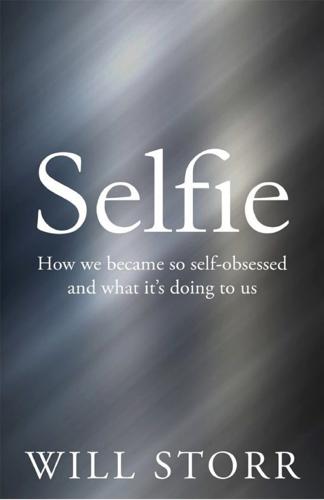
Selfie: How We Became So Self-Obsessed and What It's Doing to Us
by
Will Storr
Published 14 Jun 2017
They began to see themselves as pioneers whose pursuit of Rand’s vision of ‘virtuous selfishness’ would dismantle the calamitous Great Compression, and replace it with a world of small government, minimal taxation, deregulation and free markets in which ‘man’ would be free to compete with ‘man’. ‘We thought of ourselves as being the instigators of a revolution that was coming,’ one member recalled, in a 2010 interview with the filmmaker Adam Curtis. ‘We were so enthusiastic about what a difference this was going to make to the world.’ When Curtis asked what they hoped to achieve, she replied, ‘A totally free society.’ Rand claimed that the only thinker to have ever influenced her was the father of individualism, Aristotle. It was he who, more than two millennia earlier, had decided that a state of ‘ennobled self-love’ was a precondition for the successful pursuit of perfection.
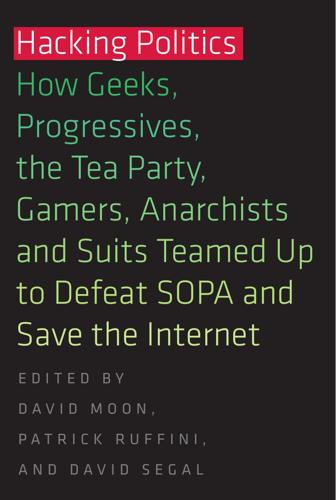
Hacking Politics: How Geeks, Progressives, the Tea Party, Gamers, Anarchists and Suits Teamed Up to Defeat SOPA and Save the Internet
by
David Moon
,
Patrick Ruffini
,
David Segal
,
Aaron Swartz
,
Lawrence Lessig
,
Cory Doctorow
,
Zoe Lofgren
,
Jamie Laurie
,
Ron Paul
,
Mike Masnick
,
Kim Dotcom
,
Tiffiniy Cheng
,
Alexis Ohanian
,
Nicole Powers
and
Josh Levy
Published 30 Apr 2013
But a substantial sub-portion of tech tends towards an anarcho-capitalist economic vision whereby an optimal society is one in which perfectly networked people-points engage in frictionless commerce, with very low taxes and a minimal social safety net, and in which unions—were they ever useful—are endemic to the ossified industrial structures that governed the Old Economy, and whose agitation unduly protects incumbents and generates economic inefficiencies. This is, in fact, much of the essence of the so-called California Ideology, an influential strain of Cyber Utopianism. (For a detailed historiography of these tendencies, watch any—ideally all—of Adam Curtis’s wonderful films, especially All Watched Over by Machines of Loving Grace.) I am not a Cyber Utopian. I think the Internet is critically important and has, and will continue to, improve peoples’ lives the world round—but only so long as we fight to make sure it remains a force for the democratization of society, rather than a tool that the already-powerful can use to entrench themselves.
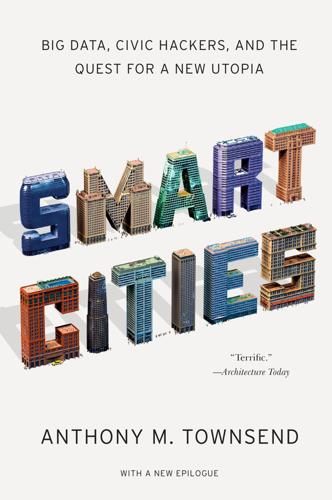
Smart Cities: Big Data, Civic Hackers, and the Quest for a New Utopia
by
Anthony M. Townsend
Published 29 Sep 2013
v=uBYsSFbBeR4. 76Justin Cook, telephone interview by author, September 11, 2012. 77Zehnder, interview, August 29, 2012. 78Cook, interview, September 11, 2012. 79Cook, interview, September 11, 2012. 80Zehnder, interview, August 29, 2012. 81Zehnder, interview, August 29, 2012. 82Michael Batty, “Building a science of cities,” Cities, 2011, doi:10.1016/j.cities.2011.11.008, 1. 83All Watched Over By Machines of Loving Grace, directed by Adam Curtis (2011; BBC). 84Jay Forrester, “System Dynamics and the Lessons of 35 Years,” in Kenyon B. De Greene, A Systems-Based Approach to Policymaking (Boston: Kluwer Academic Publishers, 1993), 202. 85Alfeld, “Urban dynamics—the first fifty years.” 86B. Raney et al., “An agent-based microsimulation model of Swiss travel: First results,” Networks and Spatial Economics 3, no. 1 (2003): 23–42. 87Michael Batty, telephone interview by author, August 19, 2010. 88“Heisenberg-Quantum Mechanics, 1925–1927: The Uncertainty Principle,” American Institute of Physics, n.d., accessed February 26, 2013, http://www.aip.org/history/heisenberg/p08.htm. 89Asimov, Foundation, 14. 90Lee, “Requiem for Large-Scale Models,” 167. 91Harrison, interview, May 9, 2011. 92Gelernter, Mirror Worlds, 217, Gelernter’s italics. 93“SimCity and Advanced GeoAnalytics,” SpatialMarkets blog, March 16, 2012, http://www.spatialmarkets.com/2012/3/16/simcity-and-advanced-geoanalytics.html. 94Lee, “Requiem for Large-Scale Models,” 169. 95Banavar, lecture, April 10, 2012. 96Gelernter, Mirror Worlds, 222.

Who Owns England?: How We Lost Our Green and Pleasant Land, and How to Take It Back
by
Guy Shrubsole
Published 1 May 2019
registered offshore in Jersey Land Registry overseas and offshore company dataset, first released November 2017, records that Elveden Estates Limited, a Jersey-based company, registered numerous land titles making up the Elveden Estate between 2000 and 2002. around £1.2 million DEFRA farm subsidy data for Elveden Farms Ltd and its subsidiaries shows that they received £1.4 million in 2015 and £1.2 million in 2016: http://www.cap-payments.defra.gov.uk/ A BBC interview Archival footage featured in Adam Curtis’s BBC documentary ‘The Mayfair Set’, Episode 1: Who Pays Wins, 42 minutes in: https://www.youtube.com/watch?v=234H8X1-JiA You can hardly David Hirst, Guardian, 27 September 1976; see also Dominic Sandbrook, Seasons in the Sun: The Battle for Britain, 1974–1979 (Penguin, 2012), p. 93. Beirut-on-Thames Abdel Bari Atwan, A Country of Words: A Palestinian Journey from the Refugee Camp to the Front Page (Saqi Books, 2007), ch. 7.
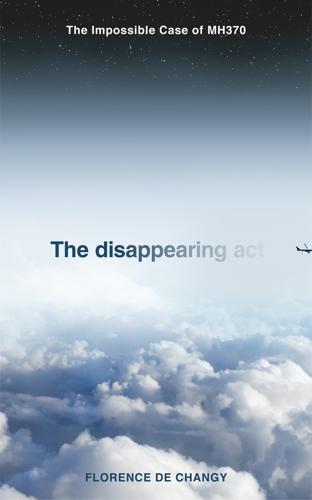
The Disappearing Act
by
Florence de Changy
Published 24 Dec 2020
To my family and friends, whose support and patience have been essential to my work. Epigraph ‘It is a riddle, wrapped in a mystery, inside an enigma; but perhaps there is a key.’ Winston Churchill, 1939 ‘We live in a world where the powerful deceive us. We know they lie, they know we know they lie, they don’t care. We say we care, but we do nothing.’ Adam Curtis, HyperNormalisation, BBC Documentary, 2016 ‘International affairs are very much run like the mafia.’ Noam Chomsky, 2020 Maps Foreword I first heard about the disappearance of a Malaysia Airlines jetliner as I was listening to the RAI news in the Fiat I had rented at Verona Airport.
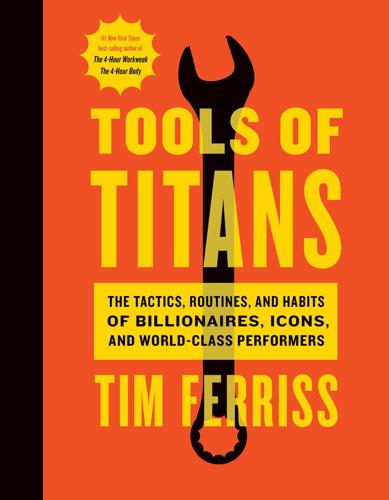
Tools of Titans: The Tactics, Routines, and Habits of Billionaires, Icons, and World-Class Performers
by
Timothy Ferriss
Published 6 Dec 2016
” ✸ One of Edward’s recommended essays “The Catastrophe of Success” by Tennessee Williams. TF: One of my favorite lines from this piece is: “For me, a convenient place to work is a remote place among strangers where there is good swimming.” ✸ Edward’s favorite documentaries Bennett Miller’s The Cruise and Adam Curtis’s films. “He’s got a four-part film called The Century of the Self, and then a three-part series called The Power of Nightmares. I think those are absolutely brilliant films, dense but really eye-opening.” TF: The Century of the Self has been recommended to me by several podcast guests. ✸ Three favorite recent films?
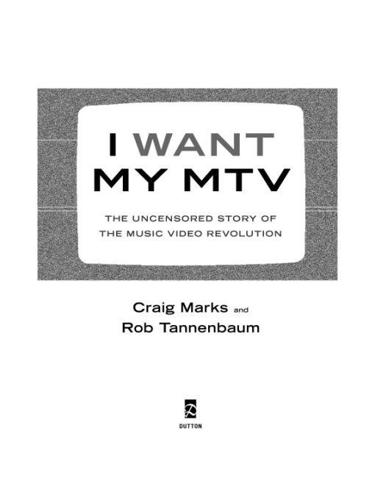
I Want My MTV: The Uncensored Story of the Music Video Revolution
by
Craig Marks
and
Rob Tannenbaum
Published 19 Sep 2011
Clash Classix Nouveau Clawson, Tim Clay, Andrew Dice Cliff, Jimmy Clinton, Bill Cobain, Kurt Cocks, Jay Cohen, Lyor Coldplay Coleman, Lisa Coleman, Signy Coleridge, Tanya Coletti, Alex Collen, Phil Collins, Phil Combonation Commodores Conner, Bruce Copeland, Miles Copeland, Stewart Coppola, Sofia Corbijn, Anton Corgan, Billy Cornyn, Stan Corradina, Linda Corrao, Lauren Cortese, Dan Costello, Elvis Coverdale, David Cox, Courteney Crawford, Cindy Creme, Lol Cribiore, Alberto Critchley, Eric Cronin, Kevin Crosby, David Crosby, Robbin Cross, Christopher Crowe, Cameron Cruger, Roberta Cuesta, Michael Culkin, Macaulay Culture Club Cure Curry, Adam Curtis, Bill Cutting Crew Cutting Edge, The Cypress Hill Dajani, Nadia Dall, Bobby Danforth, John Danger Danger Daniels, Charlie Danzig, Glenn Dargis, Manohla Davies, Kathy Davis, Clive Davis, Maria Davis, Martha Davis, Tamra Davola, Joe Dayne, Taylor Dayton, Jonathan Dead Milkmen Dean, Paul Decouflé, Philippe Def Leppard De La Soul DeMann, Freddy DeMartini, Warren Demme, Jonathan Demme, Ted Dempsey, Don Dempsey, Patrick De Niro, Robert De Palma, Brian Depeche Mode Depp, Johnny Deutch, Howie DeVille Devo DeYoung, Dennis Diamond, Brian Diamond, Jim Diaz, John Dick, Nigel Dickerson, Ernest Dickinson, Bruce Dickinson, Janice Dike, Matt DiLeo, Frank Diller, Barry Dillon, Matt Dio, Ronnie Di Palma, Carlo Dire Straits DiSanto, Tony Disney, Lillian Divinyls Dixie Dregs Dixon, Jerry Dixon, Willie DJ Hurricane DJ Jazzy Jeff DJ Red Alert DMC Doebler, Margaret Dokken, Don Dolby, Thomas Dole, Kevin Donovan, Terence Doors Dors, Diana Dougherty, Peter Drake, Bill Dr.